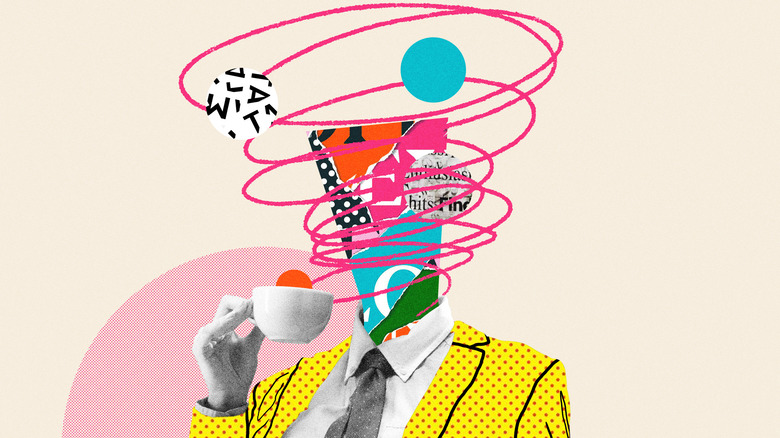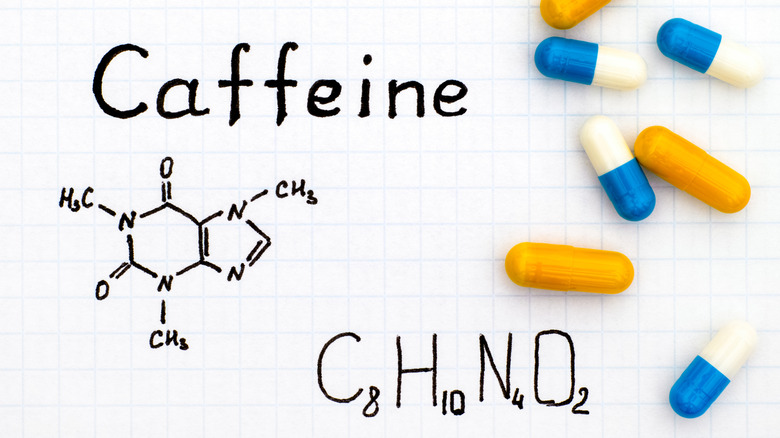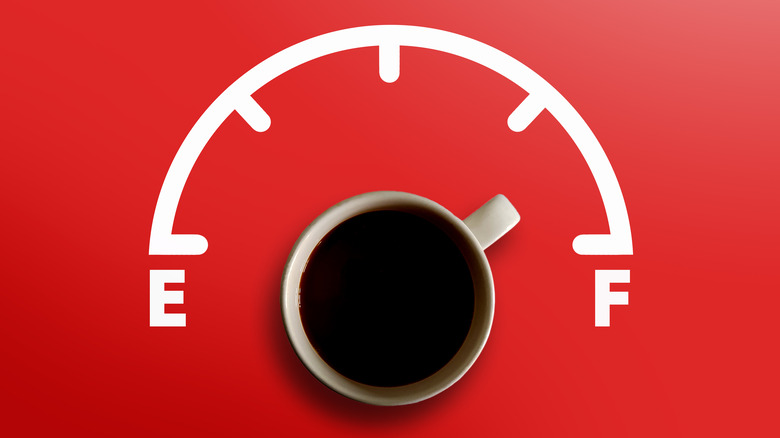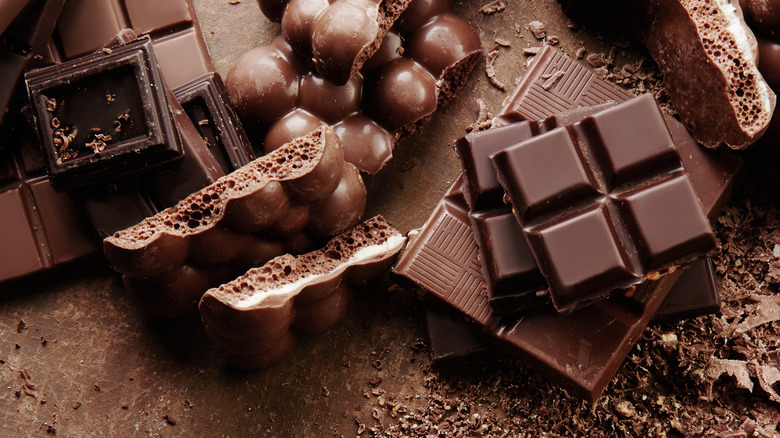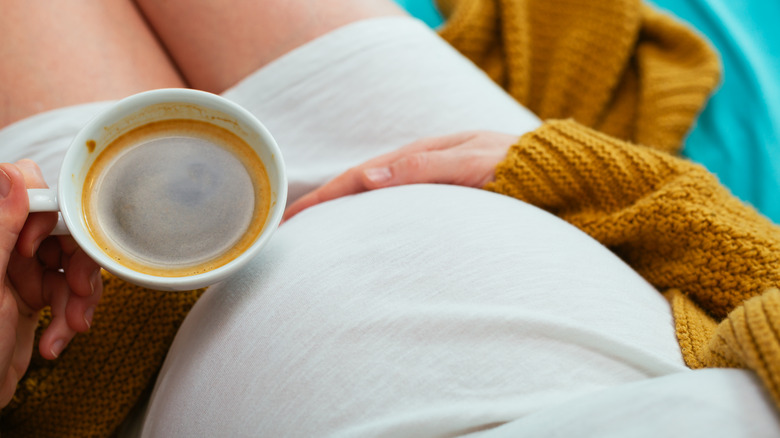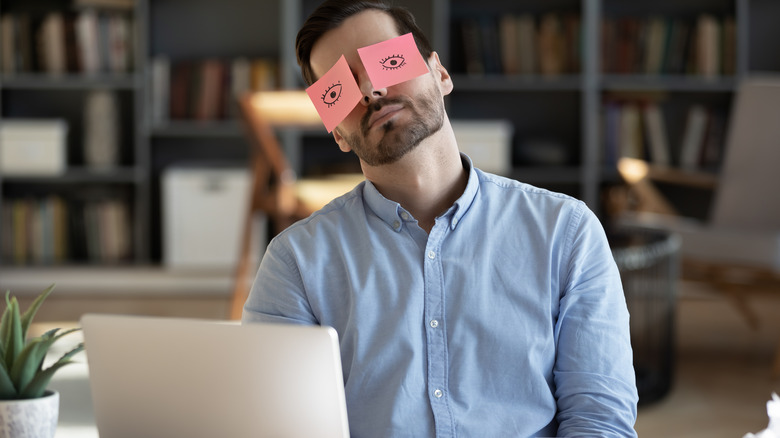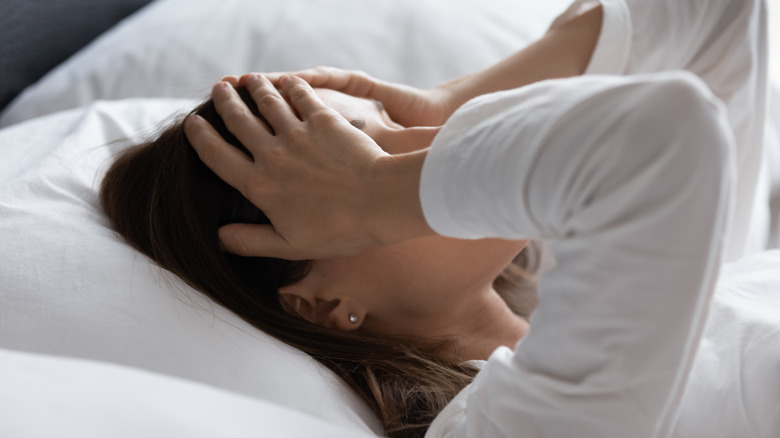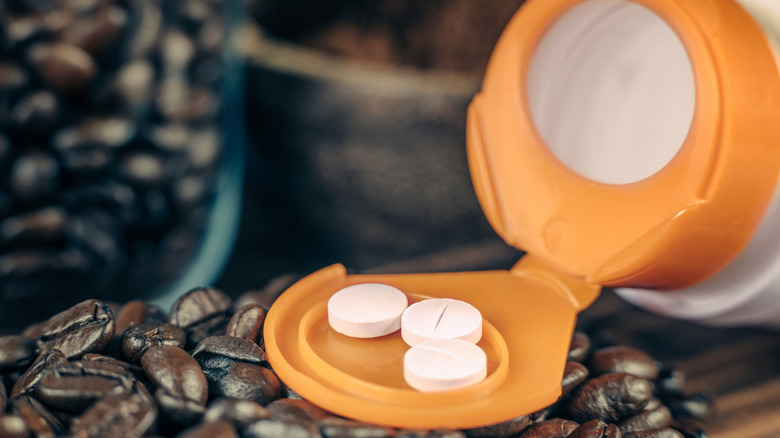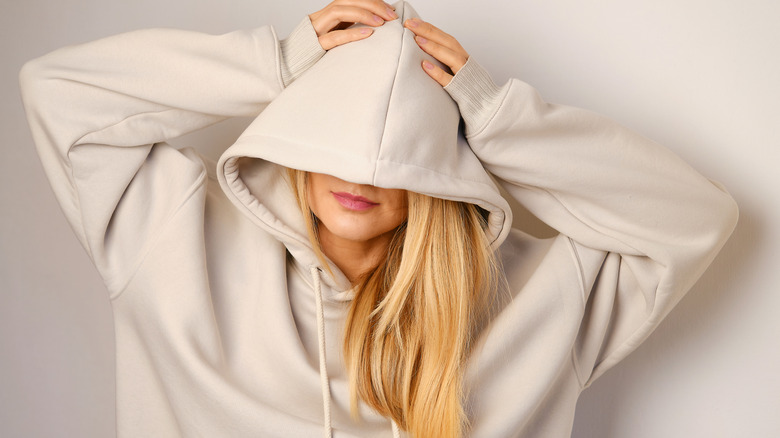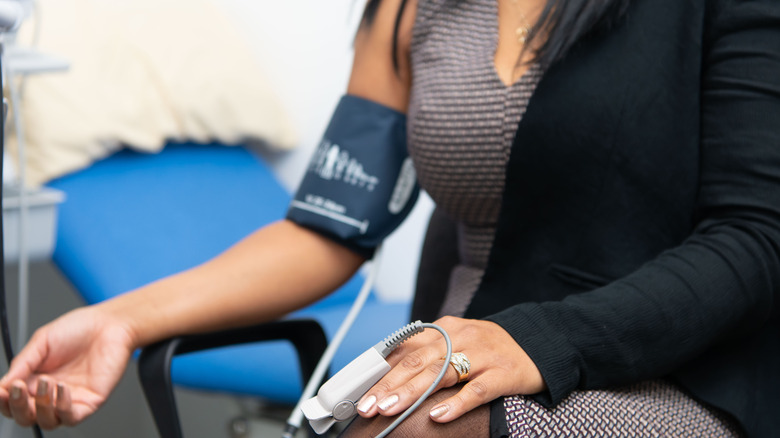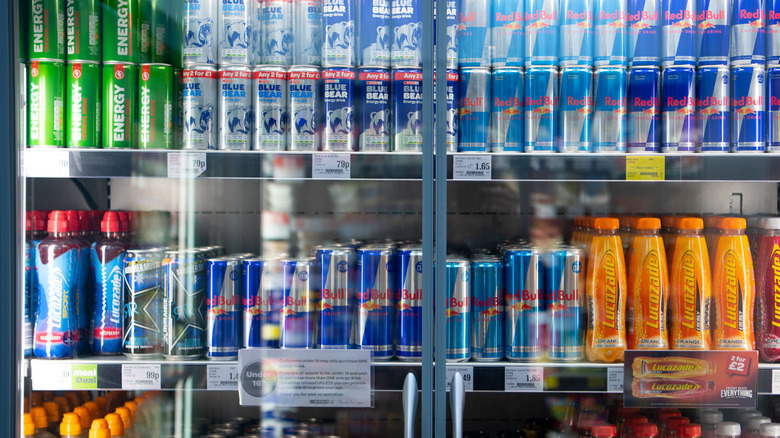Everything You Wanted To Know About Caffeine
When you wake up feeling groggy, coffee or some form of caffeine is likely your go-to pick-me-up. Caffeine is a natural-occurring substance in dozens of plants that are known for its ability to make you feel a little more alive, alert, awake, and enthusiastic during long mornings (via MedlinePlus). Although the most well-known source of caffeine is that incredible cup of joe you make each morning, it's also found in cacao plants and tea leaves.
According to an article in Psychiatry and Clinical Neurosciences, about 80% of the world's population consumes caffeinated products. Why might that be a problem? To put it simply, caffeine may be accompanied by more negative effects on the body than positive ones, especially when you consume too much.
The U.S. Food and Drug Administration (FDA) admits that overconsumption of caffeine is easy to reach. The FDA recommends just 400 milligrams of caffeine a day, at most, for healthy adults. However, there's easily as much as 100 milligrams in an 8-ounce coffee and up to 250 milligrams in an 8-ounce energy drink. Still, caffeine isn't all bad, especially when you're mindful of how much you consume each day. Here's the lowdown on caffeine.
Yes, it's actually a drug
So, we know that caffeine is technically called a drug — but is it really a drug in the way we think of the term? According to the experts, yes, it basically is. That's because caffeine can cause extreme dependence and lead to several real and dangerous reactions in the body, just like other drugs we're warned about since childhood (per the Alcohol and Drug Foundation).
Caffeine is a stimulant drug, meaning that it speeds up normal bodily processes. More specifically, it causes messages between your nervous system and body to move even faster than they usually would, which can cause reactions like higher body temperature, nervousness, jitteriness, and a lack of concentration.
These side effects sound a lot like other drugs declared illegal and unsafe for people to use if you think about it. Although caffeine is legal to sell and consume in the United States, Australia has prohibited the sale of solid foods with a caffeine concentration of 5% or more and semi-solid or liquid foods with a 1% or higher caffeine concentration, according to the Alcohol and Drug Foundation.
It works quickly
There's a reason that most people grab a cup of coffee each morning: Caffeine is linked to fatigue-busting alertness, and the results happen quickly. It's not uncommon for coffee drinkers to start feeling a bit more awake within several minutes after drinking coffee.
That's because caffeine works its way through the body very quickly, thanks to our metabolism. According to the Harvard T.H. Chan School of Public Health, it only takes the body about 45 minutes to fully absorb caffeine after consuming it. However, it doesn't always take that long to start working its magic. Many people can expect caffeine concentration to peak in the blood as quickly as 15 minutes, although those with slower metabolism might experience the peak closer to two hours later.
Furthermore, Harvard notes that consuming caffeine on an empty stomach might even help it work quicker because there won't be anything else in the gut that's competing with your body's metabolism.
It's in foods and drinks you wouldn't expect
Caffeine is a natural substance derived from plants, but synthetic versions are also used in medicines, foods, and drinks. Food and drink manufacturers might even sneak the natural stuff into the things we eat and drink, and you probably don't know they're there unless you're diligent about reading nutrition labels and ingredient lists.
Researcher and Northwestern University resident Danielle McCarthy told WebMD, "There are quite a few new energy drinks [that contain caffeine], and diet pills often use caffeine." WebMD also warns that many decaf coffees contain some caffeine, even though that's the very thing that decaf drinkers are trying to steer clear of.
A list provided by the Harvard T.H. Chan School of Public Health details how much sneaky caffeine you can expect in some of your favorite drinks and foods. For example, just an ounce of dark chocolate contains 24 milligrams of caffeine, whereas drinks containing guarana seed extract can include as much as 125 milligrams of caffeine per serving.
A family history of alcohol could make you more caffeine-dependent
The American Pregnancy Association suggests that pregnant women avoid caffeine as much as possible because of its potential effects on the growing baby. However, some women find it difficult to shake the habit, which is why Johns Hopkins researchers set to explore links between pregnant women and the challenge of avoiding caffeine. Specifically, they wanted to see if there was a connection between a family history of alcohol dependence and their personal caffeine dependence.
In the study, researchers looked at pregnant women with a "serious caffeine habit." A group of the women also had a family history of alcohol dependence, although they did not have a history of alcohol dependence themselves. The study found that half the women with a family history of alcohol dependence ignored their doctors' suggestions to cut out caffeine completely. These women continued to consume more than the maximum recommended intake for pregnant women throughout their pregnancy.
"While the majority of women in the study reduced their caffeine intake throughout pregnancy, the subgroup of women with both risk factors appears to require intervention in addition to instructions from their physician in order to assure caffeine abstinence," co-lead study author Dace S. Svikis explained.
It could improve your memory
Although lots of research points out the negative aspects of caffeine, research also focuses on the more positive benefits of the substance. Some experts believe that caffeine can even give you a brain boost, especially in the realm of memory. Johns Hopkins University researchers published the results of a 2014 study in Nature Neuroscience. This research examined the effects of caffeine on participants who don't regularly consume caffeine in food or drinks. The researchers required participants to take a caffeine pill or placebo after studying several images.
The next day, the participants reviewed the images, and researchers asked them to spot the ones they saw the day before. More people who consumed the caffeine pill than the placebo pill could accurately recall the pictures. The researchers explain that these participants spotted differences that require a brain task called pattern separation, which needs excellent memory retention to perform correctly.
Was it a fluke? Researcher Michael Yassa doesn't believe so. "Almost all prior studies administered caffeine before the study session, so if there is an enhancement, it's not clear if it's due to caffeine's effects on attention, vigilance, focus, or other factors," he explained. "By administering caffeine after the experiment, we rule out all of these effects and make sure that if there is an enhancement, it's due to memory and nothing else."
It could interfere with your sleep
If you have trouble getting to sleep or staying asleep, your doctor has probably suggested a few tricks to improve your sleep hygiene, like turning off electronic devices before bed and getting into a bedtime ritual. There's a good possibility they've also mentioned cutting out caffeine several hours before you get some shut-eye.
Because caffeine has stimulating effects, it's not surprising that it could keep you up at night. And scientific research proves that it's a possibility for caffeine drinkers. For example, one study published in a 2016 edition of Nutrition found that as many as 28.4% of respondents experienced insomnia symptoms, like difficulty falling asleep and frequent non-restorative sleep.
Of course, not getting enough quality sleep can ultimately lead to daytime sleepiness. A clinical review in Sleep Medicine Reviews found that regular, daily caffeine consumption may interrupt sleep patterns enough to cause constant daytime sleepiness. So, if you're consuming caffeine to stay more alert and awake, you might actually be getting yourself into a neverending cycle of insomnia and drowsiness.
Quitting caffeine can feel impossible
Contrary to popular belief, caffeine isn't technically addictive. The National Institute on Drug Abuse explained, "While caffeine produces a small rise in dopamine, it does not cause the large surge that unbalances the reward circuits in the brain and is necessary for an addiction." While caffeine can cause dependence, it's not necessarily considered addictive because people who crave it can still typically function without it, even if they get some negative side effects.
However, because it causes dependency, caffeine can still be very difficult to quit. The moment you start to feel low on energy and achy, it can be challenging not to reach for an energy drink or a cup of coffee. Registered dietitian Beth Czerwony told the Cleveland Clinic that caffeine quitters should be careful not to take any pain relievers that contain caffeine to get rid of headaches that often happen when you're trying to kick the habit. "You're not really helping yourself," she explained, "you're just feeding your addiction in a different way. Instead, you want to start weaning yourself down."
Czerwony recommended baby steps, like substituting your usual caffeinated drink for one with a lower amount of caffeine. Also, drink lots of water — it will keep you hydrated and reduce the sluggish effects of skipping caffeine.
Caffeine has some medicinal uses
Caffeine is in more than just food and drinks. According to WebMD, it's also in some over-the-counter and prescription medications taken both orally and rectally. Most commonly, you'll find caffeine in some headache relief medications because it has natural headache-busting properties. That's the same reason that many migraine and headache sufferers feel better after drinking caffeinated tea or coffee.
But caffeine is also in other types of medications, including those that boost mental alertness and those that help infants with neonatal apnea breathe. Some medical doctors may also prescribe caffeine to patients to improve their memory, relieve acute pain, and aid in short-term weight loss. And athletes may take caffeine pills to boost their athletic performance, as research has shown that the substance can fight fatigue and help endurance (via WebMD).
However, it's important not to self-treat your symptoms with caffeine. Instead, talk to your doctor about your symptoms. Together, you can develop a plan that may involve simple lifestyle or diet changes without adding daily doses of caffeine.
Some people should avoid caffeine altogether
Some groups of people may not be able to consume caffeinated food or drinks. Most notably, children should stay away from the drug. Research nutritionist Diane Vizthum told Johns Hopkins All Children's Hospital that although no federal guidelines are in place specifically for children and caffeine, the substance can nevertheless be dangerous for kids. "Because children are smaller in body size, it takes less to impact their functioning," explained Vizthum. "Too much caffeine can cause issues such as increased anxiety, increased heart rate and blood pressure, acid reflux and sleep disturbance. Too much caffeine is dangerous for kids, and in very high doses, can be toxic."
Other groups that should avoid caffeine as much as possible include pregnant women, people with overactive bladder, and people with sleep disorders. People with bowel problems might also want to skip caffeine. Registered dietitian nutritionist Angel Planells told Eat This, Not That, "Caffeine can increase bowel regularity, including increasing the chances of diarrhea. ... So if you have IBS [irritable bowel syndrome], it is encouraged to limit/avoid caffeinated beverages."
Caffeine might be in your clothing
Caffeine can sneak its way into things you'd never think of, like some food, drinks, and medications. But did you know that it's also been found in clothing? According to a Federal Trade Commission (FTC) press release, two companies ended up in legal hot water in 2014 for infusing caffeine into their shapewear products. The FTC alleged that these companies made claims that they couldn't back up with scientific or medical evidence. Both companies marketed the products as ones that could reduce cellulite and slim down a woman's body, partly because of the added caffeine.
Ultimately, the companies settled with the FTC. An order required them to refund customers and cease all claims that their shapewear can slim or reshape the body. Director of the FTC's Bureau of Consumer Protection Jessica Rich warned consumers: "Caffeine-infused shapewear is the latest 'weight-loss' brew concocted by marketers. If someone says you can lose weight by wearing the clothes they are selling, steer clear. The best approach is tried and true: diet and exercise."
Caffeine and coffee have ties to better health
Caffeine gets a bad reputation, but it may not be all bad news for your health. There are actually a few benefits of having moderate amounts of caffeine. According to Healthline, the substance may decrease the risk of developing skin cancer, lower your risk of having multiple sclerosis, and increase your gut's health, for starters.
Johns Hopkins Medicine also indicates several ways in which consuming a healthy amount of coffee — a leading caffeine provider — can benefit your body. Research nutritionist for Johns Hopkins University School of Medicine Diane Vizthum explained, "Caffeine is the first thing that comes to mind when you think about coffee. But coffee also contains antioxidants and other active substances that may reduce internal inflammation and protect against disease."
One layer of protection goes to the colon. According to Johns Hopkins, coffee drinkers are about 26 times less likely to develop colon cancer. The University also notes that coffee could decrease the likelihood of developing Parkinson's disease, experiencing heart failure, and getting Alzheimer's disease.
It can be bad news for your blood pressure
Do you feel your heart racing and pumping a little harder after you finish an energy drink? A lot happens in your body once you consume caffeine, and it happens fast. Therefore, the heart needs to keep up.
What happens when you feel your heart pumping is your blood pressure increasing. Caffeine can boost your blood pressure quickly, causing a temporary spike that might even feel a bit scary. Cardiologist Francisco Lopez-Jimenez explained in an article for the Mayo Clinic that this blood pressure change could happen for a couple biological reasons. One, caffeine could cause a higher adrenaline release, which naturally increases blood pressure. Two, some research points to caffeine blocking a hormone that widens arteries. When arteries narrow, your blood pressure rises.
However, not everyone experiences constant high blood pressure from drinking caffeine. "Some people who regularly drink caffeinated beverages have a higher average blood pressure than do those who drink none," Lopez-Jiminez began. "Others who regularly drink caffeinated beverages develop a tolerance to caffeine. As a result, caffeine doesn't have a long-term effect on their blood pressure." The best way to know for sure is to check in with your doctor regularly and ensure that you get a blood pressure reading at each appointment.
It could improve athletic performance
Athletes sometimes stock up on caffeinated beverages, foods, or supplements because research suggests that the substance may benefit athletic performance. One potential perk is caffeine's ability to move and break down fat through metabolic processes, which can be helpful for those trying to lose weight. Healthline explains that the nervous system responds to caffeine consumption by increasing adrenaline in the blood. Adrenaline then heads to fat cells to break them down and release fat into the blood, which exercising and burning calories can continue to metabolize.
Research from an older study published in the Journal of Applied Physiology solidified the idea that caffeine can boost metabolism. Participants took different doses of caffeine. The lowest dose was associated with better athletic performance but lower metabolic performance, while the highest amount led to better metabolic performance but lowered athletic performance.
Additionally, a more recent study published in PLOS One found that "caffeine and coffee ... were both able to improve exercise performance to the same extent, when compared to both decaffeinated coffee and placebo." The study further revealed that "the compounds found in coffee," in particular, "may alter the metabolic effects."
Too much caffeine could be fatal
As with almost anything, caffeine can be harmful — and even fatal — if you consume too much of it. Such is especially the case with food and beverages that contain large amounts of caffeine per serving, like energy shots and drinks. This is why the FDA made it illegal to sell any products that contain highly concentrated or pure liquid or powder caffeine in bulk to consumers in 2018.
A member of the Istanbul Faculty of Medicine, Erdem Kaşıkçıoğlu, penned a letter to the editor of the Anatolian Journal of Cardiology in 2017 describing the concern of highly concentrated caffeine drinks. "Because of their high amounts of caffeine and other substrates, dangerous arrhythmias can easily develop in the hearts of individuals who consume them," Kaşıkçıoğlu wrote. "The problem is that there are many additional sources of caffeine that are 'masked' by the labeling. Frequent ingredients such as guarana, ginseng, and taurine have caffeine concentrations in different energy beverages that are equal to, or higher than those found in coffee."
Back in 2012, the FDA also reported investigating 13 deaths and 33 hospitalizations related to consuming 5-Hour Energy drinks (via ABC News). At the time. Los Angeles Times also noted that there have also been FDA investigations into Monster energy drinks after receiving reports about death alleging that the drink was the culprit. However, the article revealed that the FDA "hadn't established a link between Monster energy drinks."

